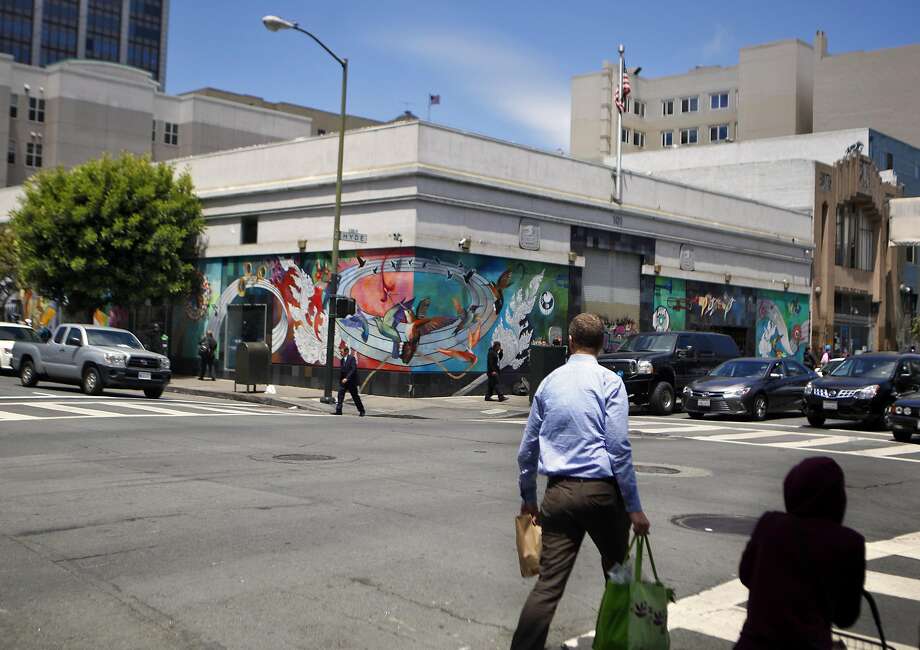Deal on old Tenderloin post office a boost for affordable housing
By J.K. Dineen
June 15, 2016 Updated: June 15, 2016 6:58pm
Photo: Michael Noble Jr., The Chronicle
The longtime post office at Hyde and Golden Gate in on a block that is notorious for gaggles of drug dealers and users that hang out alongside the building.
Facing criticism that its proposed 304-unit apartment complex on central Market Street does not provide enough affordable housing, a developer has agreed to buy the shuttered post office on Hyde Street and give it to the city for a low-income housing project.
Under the proposed deal, which the City Planning Commission will vote on Thursday, the Shorenstein family will transfer the 27,000-square-foot parcel at 101 Hyde St. to the Mayor’s Office of Housing, which would then select a nonprofit developer to build there.
The property at Hyde Street and Golden Gate Avenue, a one-story building, is approved for a 12-story mid-rise with 87 units. Shorenstein is in contract to pay $12.5 million for the property, which has been on the market for nearly a year, and also has committed to provide $6.5 million to the nonprofit housing developer picked to build on the site.
With 87 permanently affordable units, the deal could ease criticism that the Shorenstein project at 1066 Market St. represents wholesale gentrification on the edge of the Tenderloin, one of the city’s poorest neighborhood, said Jeff Buckley, senior adviser to Mayor Ed Lee on housing issues,
While the address of the Shorenstein project is on Market Street, most of the property — the former site of the Paramount Theatre — fronts onto the Tenderloin’s Golden Gate Avenue and Jones Street.
“This takes a project that had been pretty divisive and turns it into something that I think everyone can get behind,” said Buckley.

Photo: Michael Noble Jr., The Chronicle
The old post office at Hyde Street and Golden Gate in the Tenderloin will be bought by a developer and given to the city for a 12-story housing project with 87 affordable units.
Kim brokered deal
The deal was brokered by Supervisor Jane Kim. Kim said that while she generally prefers that market-rate developers put required affordable units on-site, 101 Hyde St. is a special case. Not only is the parcel fully approved for housing, as a former post office it has a symbolic significance as well. For years, the building provided post office boxes to thousands of Tenderloin residents who struggled to get reliable mail delivery service at residential hotels.
“It was a site that served Tenderloin residents and we wanted to make sure it stayed that way,” said Kim.
At a contentious hearing on the project in March, neighborhood residents complained that not only did the Shorenstein project not include enough affordable housing — they had proposed 36 units, or 12 percent of the total — but that the rent of those units still could be beyond the reach of most current Tenderloin residents. The units would have targeted households earning 55 percent of the area’s median income, $47,400 for a two-person household.
“We heard from TL residents that they can’t afford the rents under the city’s inclusionary program, and Shorenstein worked with us to come up with a creative alternative that will generate more housing at deeper levels of affordability,” said Don Falk of the Tenderloin Neighborhood Development Corp., which had appealed the original deal to the Board of Supervisors.
‘Common ground’
“We are pleased to find common ground through collaboration with TNDC,” Meg Spriggs, Shorenstein’s managing director, said in a statement. “We look forward to finally being able to move 1066 Market forward and fulfill our goal of delivering much-needed housing to San Francisco.”
The potential deal underscores the frequently debated question of how best to leverage private housing investment to generate affordable units, and who gets to live in those homes. It also shows the lengths market-rate developers must go to win community support in the current political environment, said Tim Colen of the Housing Action Coalition, which advocates for residential development.
“Shorenstein did what they had to do to save a project in which they had invested a whole lot of time and resources,” he added.
Interim use for site
The plan calls for up to $1 million of the Shorenstein money to be spent on an interim use that could include a food market, similar to the Hall at 1028 Market St. The city estimates it could take five years to raise the money needed to build the 87 affordable units, which will likely cost another $21 million.
“The most important thing is getting an interim use in there that helps promote activity,” said David Seward, chief financial officer for the nearby UC Hastings College of the Law. “Walking down Golden Gate Avenue is not a pleasant experience.”
J.K. Dineen is a San Francisco Chronicle staff writer. Email: jdineen@sfchronicle.com Twitter:J.K. Dineen (@SFjkdineen) | Twitter
No comments:
Post a Comment